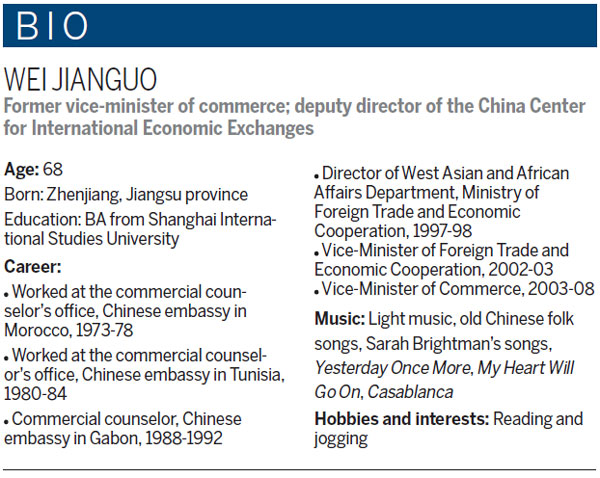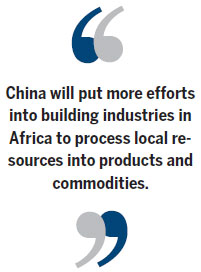Other nations can join Sino-Africa partnership
Updated: 2015-12-04 08:30
By Li Lianxing(China Daily Europe)
|
|||||||||||
Continent will benefit if China and economies such as the EU and the US collaborate on development
China will collaborate with global partners to further benefit Africa while ensuring the fruits of its development can be shared by the world, says a senior Chinese researcher.
Wei Jianguo, deputy director of the think tank China Center for International Economic Exchanges and a former vice-minister of commerce, told China Daily in an exclusive interview that investors in Africa play a complementary role to each other and that there is enough space for multilateral cooperation. He was referring to investors such as Europe, the United States, Japan and emerging economies.
|
Wei Jianguo, deputy director of the China Center for International Economic Exchanges, says all investors in Africa play a complementary role and that there is enough space for multilateral cooperation. Zou Hong / China Daily |

"China is still a latecomer compared with Europe and the US, but its development experience, hard work and respect for locals have been recognized as an advantage when exploring the African market. So when this can be combined with traditional and new players' advantages such as technology and capital, Africa will benefit more from this multilateral cooperation."
He says China is just one of the players in the global market but it has a firm belief that its development fruits and opportunities should be shared by all, rather than excluding someone by applying double standards.
"Our development in Africa can be shared by both Africans and other global partners."
Regarding concerns by some that China's collaboration with advanced countries might impact negatively on the new partnership between China and Africa, Wei stresses that Africans are the controllers of their destiny and future development.
"Our African friends don't need to worry about this because this kind of collaboration will bring even more benefits to local people. They should trust us that when collaborating with other partners, China will ensure that its development mode and experience in sharing in Africa will be combined with those advantages from new partners, while avoiding dilemmas and predicaments brought by colonialism and old development modes."
Wei also says current economic reform in China is a good opportunity to transform its involvement in Africa.
"China's economy is slowing down because it is reforming its economic structure, which will bring Africa more development opportunities. We mainly exported finished products to, and imported raw materials from, Africa, but after this transformation China will put more efforts into building industries in Africa to process local resources into products and commodities."

Thus the previous trade-led relationship between China and Africa will be upgraded to enhance Africa's industrialization, and this is why it has become one of the themes of the Forum on China-Africa Cooperation in Johannesburg, Wei adds.
He says trade between China and Africa exceeded $220 billion, and African nations' economies have developed tremendously during the past few decades, so China's engagement with Africa should meet those nations' own development demands in industrialization and modernization of agriculture.
He says these are the most successful sectors of China's development after reform and opening-up started in the late 1970s, so its experiences and other lessons could be passed on to Africa.
"Africa has been suffering from food insecurity and cannot produce enough agricultural products to meet demand. But China's experiences in agriculture during the past three decades have proved that it can feed nearly 20 percent of the world population with only 7 percent arable land. Thus, helping Africa develop its agriculture sector is a more feasible approach to eliminating poverty and fostering sustainable development, as it has better land, weather and labor conditions."
China has a huge amount of experience in this field, so it not only can keep training agricultural experts for, and sending proper technologies and skills to, Africa, but also bring in more large agricultural equipment, seed production, fertilizer industries and other agricultural infrastructure.
Another bottleneck containing Africa's development is industrialization, since it began late and moved slowly. That was mainly because Western colonialists didn't put industrialization on Africa's agenda, Wei says.
He says one of the measures is to establish more industrial parks in countries where there are few, if any.
"It will include processing parks for export, infrastructure parks, and research and development parks. Our industrial advantages can be found in many fields like machinery and power equipment, so these can be exported to Africa with related skills and technologies. Africa will accelerate its industrialization. Also, modernization of agriculture will benefit from this.
"Africa needs to be more open in the industry and agriculture sectors to attract more foreign investment, especially companies from China. This means the government should not only concentrate on facilitating trade, but more importantly on facilitating investment. Visa applications are the first step to smooth the whole process, as most African countries are still using the same procedures as 30 or 40 years ago, which take ages and may generate corruption."
Another measure that can be tried is to arrange for privileged terms for special industrial parks and agricultural demonstration areas to avoid double taxation and facilitate operations, he says.
"We can sign free trade agreements with some Belt and Road Initiative-related countries in Africa like Kenya or Djibouti, as we have done with other countries, to make the process more convenient for investors, Also, releasing more financial space to China is also a way to accelerate investment, as Chinese renminbi will become a significant global investment and trade currency."
The most crucial measure that should be taken by African governments is to establish a robust talent pool to establish its own technicians, managers and entrepreneur teams.
"These people are vital to any of the sectors and they can be trained by Chinese or other partners, but the ultimate goal is to establish a complete education system at all levels to maintain a consistent supply."
For Chinese companies, choosing the right investment destination in Africa and the right industry is vital. They also have to realize that respecting local culture is crucial for a sustainable business, as is ensuring the language barrier is addressed. Implementing social responsibility measures and protecting the local environment when carrying out projects also should be significant parts of a company's overall investment strategy in Africa, according to Wei.
"It also has to kept in mind that you are not coming to make money only, but also to transfer your technology and skills to local people so that when you finish your project, local staff still can make a living using your legacy," he says. "The Chinese government in this regard needs to strengthen its education and supervision over potential investors in Africa, and a legal framework needs to be established for use when necessary."
Yan Lin contributed to this story.
lilianxing@chinadaily.com.cn
(China Daily European Weekly 12/04/2015 page32)
Today's Top News
Xi in South Africa to boost China-Africa cooperation
SOEs face headwinds as 21% witness profits decline
President Xi arrives at South Africa for state visit
China ready for risks after yuan included in SDR
Premier League coaches to aid China's soccer goal
Chinese companies invest in City Football Group
Investment expected as Xi arrives in Zimbabwe
Xi's Zimbabwe visit to elevate bilateral ties to new high
Hot Topics
Lunar probe , China growth forecasts, Emission rules get tougher, China seen through 'colored lens', International board,
Editor's Picks

|

|

|

|

|

|







